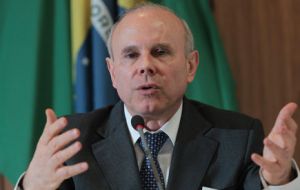MercoPress. South Atlantic News Agency
Fearing lesser global liquidity, Brazil eliminates tax on foreign capital inflows
 “We have observed a reduction in the international liquidity coming to Brazil” admits Mantega
“We have observed a reduction in the international liquidity coming to Brazil” admits Mantega Brazil will scrap a tax on foreign investments in local debt, a surprise move that could help stop a sharp depreciation of the country's currency which lost 7.6% in the past three months and that threatens to stoke already high inflation in Latin America's largest economy.
In a press briefing on Tuesday Finance Minister Guido Mantega said that a drop in foreign inflows prompted the removal of the financial transaction tax, known as IOF, on foreign purchases of government bonds and other fixed-income investments.
“We have observed a reduction in the international liquidity coming to Brazil... We are removing the obstacles for the entry of capital,” said Mantega, who added that the move was not aimed at fighting inflation.
Mantega made the statement after meeting with President Dilma Rousseff .
The reduction of capital controls will likely help the Real rebound from near four-year lows and ease pressure on inflation, which has turned into a political liability for President Rousseff as she prepares to run for re-election next year.
Earlier in the day, central bank director Aldo Mendes said Brazil may have to live with a weaker Real if the depreciation was in line with the movement of other currencies.
The Brazilian central bank, which enjoys de-facto independence, surprised investors last week with an aggressive 50-basis-point interest rate hike (to 8%) in a bid to control stubborn high inflation.
The removal of the 6% tax, effective Wednesday, takes away a key barrier Brazil had raised to prevent the Real from strengthening too much and hurt local industries and exporters.
The IOF tax, which was first raised in late 2009, was aimed at limiting the surge of cheap money flowing into the country after developed nations loosened monetary policies to stimulate their economies.
However, worries that the United States would soon cut monetary stimulus has turned things around, dragging down the Real and other emerging-market currencies.
”Today, with the market returning to normal and the (U.S. Federal Reserve) likely reducing its expansionist policy, we can remove this obstacle,” Mantega said.




Top Comments
Disclaimer & comment rules-

-

-

Read all commentsAt last! Something that will help Brasil get the money they desperately need to fund the infrastructure projects.
Jun 05th, 2013 - 01:03 pm 0And it is about time that Brasilian industry tried to compete without the financial crutches that encourage sloth and avarice.
Mantega made the statement after meeting with President Dilma Rousseff. I bet the conversation went something like this:
Dilma “I have backed you against most of the western world who wanted you gone, what are we going to do now the International Money is in the shitter and we won’t get going with all the projects I have announced believing your twaddle that we would be alright with the foreigners?”
Mantega: “my assistant who has just resigned had this idea but we will have to make the industrial sector work for a living: what do you think?”
Dilma “Get on with it and it had better work or we will see another Finance Minister in place”.
Bread for today .........hunger for tomorrow. And some guys say that brazilian economy is strong.
Jun 07th, 2013 - 02:49 am 0Brazil is the most completely country in the world. Strong in all structures: primary, secondary and services. For fall Brazil, need one hundred Guido Mantega, Chris.
Jun 07th, 2013 - 10:04 pm 0Commenting for this story is now closed.
If you have a Facebook account, become a fan and comment on our Facebook Page!